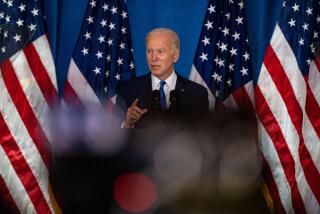Opinion: Obama commuting Chelsea Manning’s sentence was an entirely defensible act of mercy

By definition, the exercise of clemency is an act of mercy, not the meting out of mathematical justice. President Obama’s decision to commute the sentence of Chelsea (formerly Bradley) Manning is a defensible use of that power.
The obvious argument for mercy is Manning’s recent ordeal as a transgender woman in a men’s military prison. But another factor is the harsh treatment Manning has received virtually from the time the young Army private was identified as the source of classified information supplied to WikiLeaks.
For the record:
10:53 a.m. Nov. 15, 2024An earlier headline said Manning received a pardon from President Obama. Her sentence was commuted.
After being arrested in 2010, Manning was held in virtual solitary confinement for 23 hours a day at a Marine Corps brig and sometimes stripped naked. Even after Manning pleaded guilty to offenses that could have led to a 20-year sentence, the Army insisted on a trial on more serious charges, including “aiding the enemy,” which could have led to a sentence of life in prison. (Manning was acquitted of that charge by a military judge.)
In 2013, when Manning was sentenced, the Los Angeles Times said this in an editorial:
“In sentencing Army Pfc. Bradley Manning to 35 years in prison, a military judge disappointed both the prosecution, which had sought a 60-year term, and Manning’s most ardent supporters, who believe he should serve no time at all. Assuming that Manning is released on parole after a reasonable time, the sentence imposed by Col. Denise Lind strikes a reasonable balance between the damage Manning did to national security and the service he performed by exposing certain matters to public attention.”
The editorial concluded: “Manning’s supporters are urging President Obama to pardon him or commute his sentence to time served. That is both unlikely and unjustified; even if he was engaging in principled civil disobedience, Manning should face some consequences for violating the law. But if Manning is denied parole after serving several years in prison, a future president should be willing to consider clemency.”
As a result of Obama’s action, Manning will be free in May, which isn’t that much earlier than in the scenario sketched out in the editorial. The earlier release is more than justified by sympathy for Manning’s medical issues and the difficulty the military is having addressing them as long as she is a prisoner.
Those who would oppose Obama’s act of clemency are straining the quality of mercy.
Follow the Opinion section on Twitter @latimesopinion and on Facebook.
MORE FROM OPINION
Trump says he’ll unite the country. Yeah, right
Farewell to Barack Obama: A humane, intelligent and (mostly) effective leader
Boycotting the inauguration may be the right protest but the wrong battleground
More to Read
A cure for the common opinion
Get thought-provoking perspectives with our weekly newsletter.
You may occasionally receive promotional content from the Los Angeles Times.











